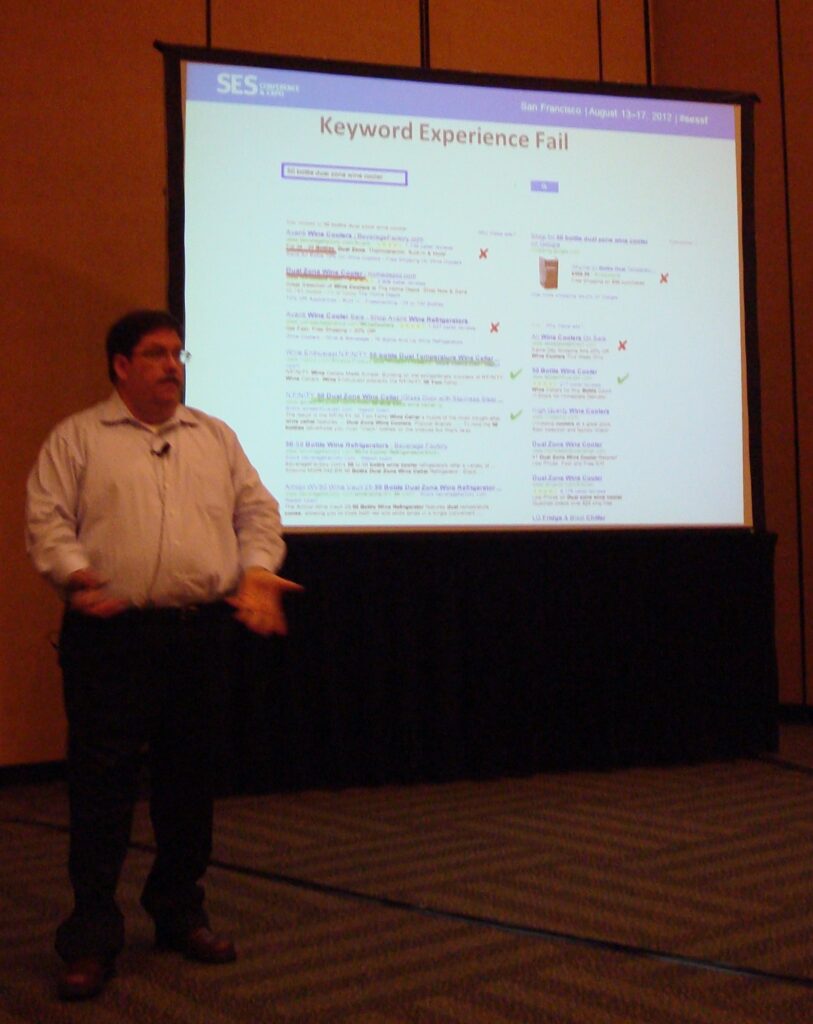 Keywords are the core of your search engine marketing strategy. Most of us know the basics when it comes to brainstorming, generating and finalizing a list, but how can your company get beyond the basics and focus on advanced keyword analytics. The main focus of the presentation by Bill Hunt (@billhunt) at SES San Francisco focused on moving beyond data and focusing on consumer intent.
Keywords are the core of your search engine marketing strategy. Most of us know the basics when it comes to brainstorming, generating and finalizing a list, but how can your company get beyond the basics and focus on advanced keyword analytics. The main focus of the presentation by Bill Hunt (@billhunt) at SES San Francisco focused on moving beyond data and focusing on consumer intent.
When we type in a specific inquiry we expect to find what we are looking for, but often paid search results fail us. In order to capture the user who may be disappointed by search results, marketers can better use keywords leveraging advanced keyword modeling.
Advanced Keyword Modeling
- Understand the ‘voice of the customer’
- Effectively map your content with query and query intent
- Identify new products and services
- Create and influence PR & social media opportunities
There are many opportunities for marketers to move beyond Keyword Research 101 and leverage analytics which will maximize keyword strategy. Potential strategies include identifying missed opportunities or finding “needle in a haystack” keywords.
We may make excuses for not updating our keyword strategy and continuing to leverage a keyword strategy which is less than optimal. Most common reasons why we are not updating our keyword models:
- Not enough time
- Too complicated
- Can’t make changes to strategy
- Management won’t listen
- If manager knew how bad current list was we would get fired
Despite the excuses, Bill expands on the realized benefits of updating the your keyword strategy. For example, an electronics retailer that was able to find significant traffic for end of life products which had no representation on their website. Or a travel site that was able to swap top ranking, outdated pages for the current, optimal version of an offering.
Optimize Better Using Advanced Analytics
Optimize for different states in the product cycle or user intent. Create content which is optimized for user searches targeted to specific stages in the sales funnel. Optimize for users looking for:
- Product to use or information
- Specific features or functions
- Comparing brands
- Discounts
- Customer services inquiries
Understanding Keyword Qualifiers
Target keywords which will help you isolate specific opportunity, interest, audience or need. Using a keyword worksheet, which includes description and buying cycle stages, in order to segment by features, functions, types and anything that allows you to understand searchers’ mindset. For example, analyzing current keyword usage is social media and analytics can allow the marketer to segment keywords by buckets. Keyword buckets will allow you to highlight the opportunities to target the topics which are most important to consumers.
Highlight Missed Opportunities and Underperforming Keywords
Based on market data you can determine how many clicks you have the potential to receive for a keyword, and in turn, the amount of clicks which you are missing. By honing in on the missed opportunities, you can emphasize the words where you should be ranking better organically.
On the other hand, there are some cases, where you are already ranking well for keyowords, but not receiving the clicks which you would expect. These keywords highlight an opportunity to optimize the snippet appearing in the description to make it more compelling to the user.
Both of these analytics models reveal opportunities to better refine your keyword strategy in order to capitalize on additional visitors and revenue.
Align Keyword Strategy to Social Media
Social media provides a rich opportunity to identify and leverage keywords in order to better target customers based on intent. Bill offers tips in order to align your keyword strategy with social media:
- Add Tier 1 keyword to social media monitoring
- Understand the sentiment of keywords
- Understand the context of the words
- Compare search volumes – conversations to conversions
- Identify influential social media sites including blogs and forums for link building
Keywords are vital to an online marketing strategy. Bill compels us to move beyond the basic “broad” match strategy to focus on keywords which are going to help companies realize maximize benefit from resources. In order to leverage advanced keyword analytics you must understand the intent of user queries, focus on the real performance of keywords and understand the context of queries.


